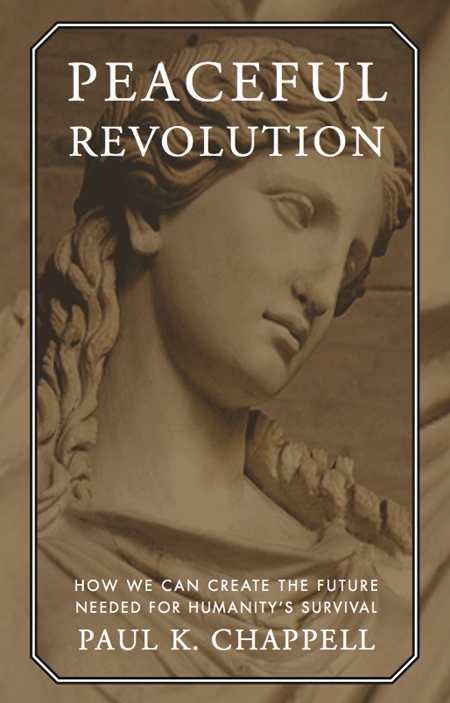Peaceful Revolution
How We Can Create the Future Needed for Humanity's Survival
n this inspiring appeal for global peace, Chappell calls readers to action and illustrates how his own personal experiences, historical events, and even popular culture demonstrate that war is a learned response and therefore a choice, not an inevitable outcome.
Chappell draws on his background not only as an author who has written extensively on the issue (this is his third book on the topic) but also as a West Point graduate, a war veteran, and the Peace Leadership Director at the Nuclear Age Peace Foundation, to prove that peace is an achievable goal. His candid descriptions of his own personal struggles that trace back to an abusive childhood further support his message that it is possible to channel seemingly destructive impulses into positive actions.
He identifies seven “muscles” that need to be developed to achieve peace: hope, empathy, appreciation, conscience, reason, discipline, and curiosity. To explore these principles and how they can lead to an understanding that each of us is a member of a “global family,” he recounts events from his time serving in the US Army during Operation Iraqi Freedom, the difficulties he experienced growing up as a multiracial child struggling to fit in, and the continuing effects of abuse that began at age four.
Chappell offers further examples, using theories of psychology and philosophy and narratives in Greek mythology, literature, and popular culture. The quotes he includes from military leaders are most persuasive, particularly for critics who would argue that peace is an unachievable goal, because Chappell understands the principles of the military firsthand and does not reject them; instead he shows that leaders strongly support the goal of peace rather than war.
By pointing to past social justice movements—including the civil rights movement, the abolition of slavery, and women’s suffrage—that were initially not supported by political leaders but ultimately succeeded, Chappell encourages readers to see historical events as a potential model as well as motivation for the global peace movement.
For readers who already see global peace as a realistic goal, Chappell’s well-researched, thought-provoking book will reinforce those beliefs. For those who see it as a naive goal, he presents convincing examples to persuade otherwise.
Reviewed by
Maria Siano
Disclosure: This article is not an endorsement, but a review. The publisher of this book provided free copies of the book to have their book reviewed by a professional reviewer. No fee was paid by the publisher for this review. Foreword Reviews only recommends books that we love. Foreword Magazine, Inc. is disclosing this in accordance with the Federal Trade Commission’s 16 CFR, Part 255.

